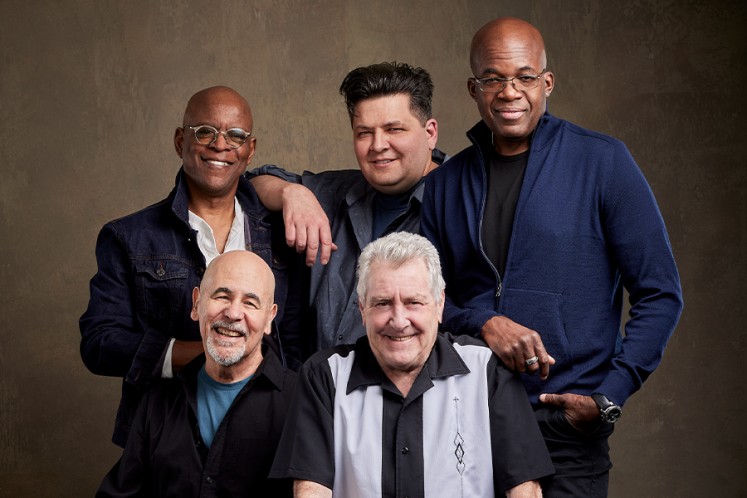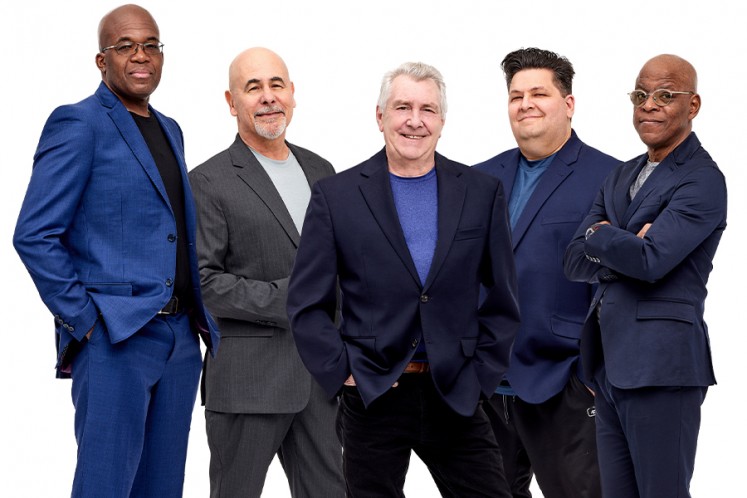Spyro Gyra
In 2024, Jay Beckenstein and Spyro Gyra are observing the 50 th anniversary of what started as a diversion, something that was just for fun and 25 cents at the door. It began inauspiciously when Beckenstein and some musician friends in Buffalo, New York, organized a get-together on their shared night off from working in bands that actually made money. He and childhood friend Jeremy Walls called those evenings Tuesday Night Jazz Jams. Saxophone player Beckenstein was a biology major at the University of Buffalo before switching to music performance, and one biology lesson stuck: he remembered a freshwater green alga with spiral bands of chloroplasts. When their popularity rose and they added a high-schooler named Tom Schuman to join them, club owners insisted on a real name. Beckenstein remembered that biology lesson and called the group Spyro Gyra. “It began as a joke,” Beckenstein said some years ago. “I said ‘spirogyra,’ he misspelled it and here we are thirty years later. In retrospect, it’s okay. In a way, it sounds like what we do. It sounds like motion and energy.”
Beckenstein loved playing in clubs around Buffalo in the 1970s. The Long Island-born musician grew up listening to the music of Louis Armstrong, Charlie Parker, Sonny Rollins and Dizzy Gillespie. “Not many people know it, but Buffalo was like a mini Chicago then, with a smoking blues, soul, jazz, even rockabilly scene, of all things,” he said. “After being confined to classical music for so long, it was heaven. I was in the horn section around town, backing some great vocalists.”
The band developed such a good reputation in Buffalo that they began to get local airplay. Beckenstein decided to capitalize on it by pressing 500 records himself and selling them out of the trunk of his car in Buffalo, Cleveland and Rochester. They did a commercial and began selling more and more. “When I listen to that recording, I hear seeds of the music that made us popular,” Beckenstein said. “It was pretty innovative at the time, I guess, a strange but still accessible blend of jazz, R&B and even Caribbean music. It’s funny how people didn’t know what to make of it and now it’s so ubiquitous.”
Beckenstein and Spyro Gyra wanted to push the jazz envelope and they received some flak over it. “When we first started, a lot of the jazz purists got on our case about calling what we did jazz and now it’s funny to hear us getting respect from the same people,” he said. Like, ‘Wow, what you guys did was so much more intriguing than some of the stuff they hear today.’ Art manifests itself in a multitude of styles and contexts. Isn’t that why we started to play in the first place?”
At the end of 2019, Spyro Gyra released a new album, Vinyl Tap, the first album of new material in six years. It’s full of surprises, like a Latin big band take on Cream’s “Sunshine of Your Love,” a stunning arrangement of Blind Faith’s “Can’t Find My Way Home” and a bluesy, slowed-down version of Squeeze’s “Tempted.” It took risks that paid off.
Art Good, the host of the Jazztrax radio show, sent the group’s manager a note: “When I saw that Spyro had done an album of covers, I cringed,” he wrote. “Then I was terrified to begin listening. Then I listened. Now, I can’t stop listening. Jay and the guys have pulled off an incredible feat, an entire album of incredible ‘coverings’ of great songs instrumentally. Everyone’s taking off on their different instrument solos is captivating, Drum solos aren’t ‘drum solos’ here. Bass solos aren’t just ‘bass solos’ here. Because of Spyro’s distinctive players, what normally would be just bass and drum solos just further define these incredible classic rock songs. This album is positively fabulous.”
Now, 50 years in, Spyro Gyra has performed more than 10,000 concerts on six continents, released more than 30 albums, and sold more than 10 million of them. They have gathered gold and platinum along the way. The band of humble beginnings in Buffalo, New York, could rest on its laurels, but that’s not Spyro Gyra. Beckenstein and his pals are still having too much fun and touching audiences.
“My hope is that our music has the same effect on the audience as it does on me. I’ve always felt that music, and particularly instrumental music, has this non-literal quality that lets people travel to a place where there are no words. Whether it’s touching their emotions or connecting them to something much bigger than themselves, there’s this beauty in music that’s not connected to sentences. It’s very transportive. I would hope that when people hear our music or come to see us, they’re able to share that with us. That’s the truly glorious part of being a musician.”
When asked about the prospect of retiring, Beckenstein demurs. “Hey, I think about it, but I got a taste of it during the height of the Covid pandemic and I didn’t like it,” he said. “I didn’t like it at all. It gave me a slight feeling of being purposeless. On the road, there are many times when getting from Point A to Point B is painful, and I might wind up muttering under my breath, ‘Why am I doing this?’ There’s no question when I ‘m not doing it, it can feel like there’s no reason for me to be around, so I’m in it for as long as I can do it.”
So are we.






